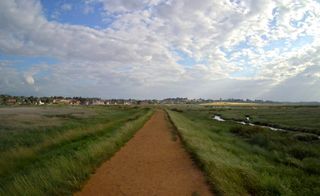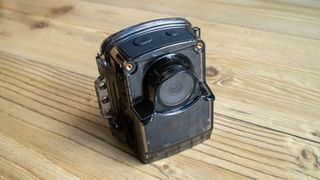Two-minute review
An easy-to-use professional time-lapse camera, the Brinno TLC 2020 is versatile, with several capture and exposure modes for different times of the day, and tough when seated in its waterproof housing. The camera has a minimum focusing distance of 60cm, so with the stock lens, it’s most suitable for shooting wider scenes. There are also more advanced zoom lenses available separately, with improved image quality, which can be used to shoot more intimate scenes. I tested the camera with the stock lens, so we’ll focus on this.
The TLC 2020 is available in a variety of kits. I used the Brinno TLC 2020-M Outdoor Time Lapse Bundle with Housing & Mount kit, which costs $429 / £424 / AU$719. In this kit, you get the TLC 2020 Camera, the waterproof housing, a lens cap, a lens screwdriver, a USB-C cable, silica gel (to combat condensation in the housing), two bungee cords, four AA batteries, an AWM100 (screw-in) Camera Wall Mount, a 16GB microSD card and SD adaptor. The kit with everything except the wall mount costs $399 / £399 / AU$679, with other kit options also available.
Measuring just 2.4 x 2.8 x 1.8in / 60 x 70.6 x 46.6mm and weighing 6.7oz/190g, including batteries and a microSD card, it’s a small and lightweight camera, and using the waterproof housing only adds a small amount of size and weight. The housing has rubber buttons for controlling the camera, a compartment at the bottom to hold the included silica gel to avoid condensation, and provides IP67 water resistance. It’s made of tinted plastic, except for the clear lens section, so it’s best to adjust exposure with the rear door open.
There are five buttons in total and a 2in TFT LCD screen on the back for composing shots and adjusting settings. The screen is a little dark, which makes it tricky to manually adjust exposure, but menu navigation is simple, and you can be set up and ready to shoot within a minute if shooting a shorter time-lapse over minutes or hours. Setup time for long shooting periods takes a little more time, but only because you have to set the days and start and finish times for each day alongside shooting frequency and camera settings. There’s no remote or Wi-Fi control, so you need easy access to the camera to change settings or batteries.
The TLC 2020 runs on standard AA batteries or can be powered externally via the USB-C port on the side of the camera. However, this isn’t possible when the camera is in its waterproof housing, which is a little odd considering external power is useful for shooting over long periods when the weather is likely to change. If the case did allow for cable pass-through, you’d still have to protect the USB power bank from the elements, though.
Fresh AA batteries can last up to 99 days, depending on the frequency of the shooting interval and the AA battery type used, so this isn’t a major issue. Plus, the TLC 2020 has a battery type option that optimizes battery use depending on whether you’re using Alkaline, lithium, or rechargeable batteries.
The great thing about this camera is that it’s well-equipped for shooting long-form time-lapses that are days, weeks, or even months in duration. It also has a few features up its sleeve that make it a versatile option beyond its ability to capture time-lapse videos. The TLC 2020 can also shoot Step Video, where you record short videos at set intervals, Stop Motion, for creating animation videos, and it can capture photos at 1080p.
The f/2.0 lens provides a full-frame equivalent of 19mm with a 118-degree field-of-view and noticeable fish-eye/barrel distortion with closer subjects, which eases off with wider scenes. Image quality, on the whole, is good, but not at the level of a smartphone and certainly not a mirrorless camera. Creating time-lapse videos with the TLC 2020 is incredibly easy, though, plus it offers the long battery life and weatherproof housing.
The settings available for adjusting images include exposure compensation, white balance, sharpness, contrast and saturation, with an HDR option to increase detail when required, so what’s available is limited. To be fair, these are enough to fine-tune time-lapse videos to your liking while keeping everything easy to use. The screen is darker than the output, so you have to factor this in when setting EV/exposure compensation. In most situations, EV 0 looks dark, but the output is absolutely fine. Auto white balance is also more effective than using white balance presets such as Daylight, which is slightly too warm.
Brinno TLC 2020 Time-lapse
Should I buy the Brinno TLC 2020 Timelapse Camera?
Buy it if…
Don’t buy it if…
How I tested the Brinno TLC 2020 Timelapse Camera
The Brinno TLC 2020 was tested over several days in different locations to see how it copes with different weather conditions and environments. The focus of the testing was the time-lapse functionality rather than any other features, although additional features have been covered in the review.
The time-lapse videos captured ranged from 30 minutes to several hours, depending on the interval frequency. It was, however, impossible to test capture over extended periods, so long-term scheduling functionality was set up and started to test ease of use and reliability.
With nearly 30 years of photographic experience and 15 years working as a photography journalist, I’ve shot many time-lapses using mirrorless cameras and DSLRs, so shooting with a dedicated time-lapse camera was much easier and provided straight-out-of-camera videos without the need to process photos and convert them into a time-lapse.
First reviewed July 2023




